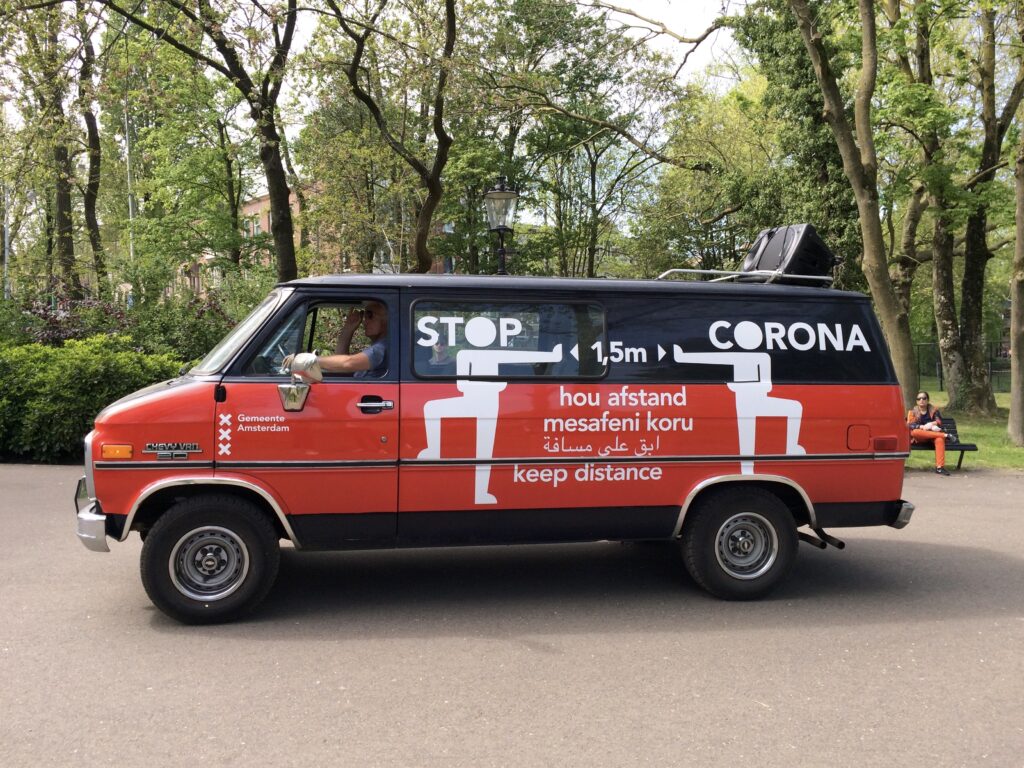Image: J.R. Bosma (2020)
In the 2021-2022 ASCA Cities seminar we will continue to discuss recent developments in urban life with the current and ongoing global pandemic. In taking up the theme of “(Post)Pandemic Urbanism #2: Unfolding the Socially-Distanced City,” we are particularly interested in examining the intersections between digital technologies and contemporary urban environments, from the vantage point of creative, cultural, aesthetic and political practices.
This year’s seminar will focus in particular on discussing the socially-distanced city as a developing process that encompasses issues of cross-disciplinary, experimental and technological initiatives, while questioning its concerns, possibilities and limitations. Born from the necessity of limiting physical human contact, restricting movement, and staying home in hopes to contain and reduce the rate of infections (Byrne 2020; Rogan 2020), the socially-distanced city brought forward reflections regarding our understandings of proximity, embodiment, freedom, nature, city, state and levels of tolerance (Moyer 2020). Under “unprecedented conditions of virality” (Leszczynski & Zook 2020), related to not only the pandemic but also, for example, the spread of misinformation, global protest movements, and other urban crises, we find that new socio-political arrangements in urban governance (McGuirk et al 2020) and commercial opportunism masked as “platform philanthropy” (Cinnamon 2020) have emerged. Focussing on unfolding, we want to draw attention to how the socially-distanced city may seem to be partly returning to a pre-pandemic state, while in that process certain aspects of a pandemic urbanism remain. How are the roles of digital technologies, platforms and data reconfigured in post-pandemic cities? How does this affect “everyday contingencies of the comings-together of platforms, cities, and urban residents” (Leszczynski 2019: 14)? In what ways does the socially-distanced city shift urban dwellers’ agency to surveillance technology and city platforming? How are urban political and legal infrastructures affecting representation and meaning in these unfolding processes?
Engaging with and expanding on such questions, the seminar seeks to analyse contemporary cities by exploring a diverse set of topics, case studies and geographical locations. We will consider, for instance, recent work on “disrupted” urban experiences (Kaufmann et al 2020; Pinkster 2020), “pandemic geographies” (Andrews et al 2020) and “invisible urban data” (Verhoeff 2020), and the role of digital “urban interfaces” in new participatory engagements and cross-disciplinary creative practices (Merx 2017). In doing so, we are not only responding to issues of digital urbanism in the (post)pandemic situation, but also investing in a critical re-assessment of our chosen approaches for the cultural study of cities today.
Programme
Fri. 18 Feb. 2022: Reading/discussion session. Location: online, Time: 3-5pm.
Fri. 11 Mar. 2022: Ameneh Solati and María Mazzanti (Failed Architecture), “Control and Resistance in Public Space”, Location: online, Time: 3-5pm.
Fri. 8 Apr. 2022: Valentina Carraro (UvA), “Jerusalem Online: Critical Cartography for the Digital Age”, Location: online, Time: 3-5pm.
Fri. 13 May 2022: Thijs Jeursen (Utrecht University), “Playing the City: Urban Representations and Spatial Practices in Digital Gaming”, Location: room 0.16, Turfdraagsterpad 9, Amsterdam, Time: 3-5pm.
Fri. 10 Jun. 2022: Agnieszka Leszczynski (Western University), “Urban Platform Visualities: Aesthetics, Desire, Communication”, Location: room 0.16, Turfdraagsterpad 9, Amsterdam, Time: 3-5pm.
For more information, please contact the organisers: Jelke Bosma (J.R.Bosma@uva.nl), Tânia Cardoso (t.a.cardoso@uva.nl), or Carolyn Birdsall (c.j.birdsall@uva.nl)
